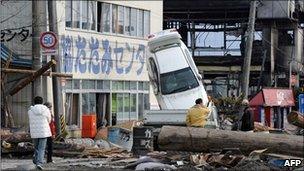Cameron: 'Severe concern' for Japan earthquake Britons
- Published
David Cameron: "We have severe concerns about a number of British nationals"
Prime Minister David Cameron has said there are "severe concerns" for a number of British nationals after the earthquake and tsunami in Japan.
Mr Cameron told MPs the devastation was of "truly colossal proportions" but there were no confirmed UK fatalities.
The UK had offered its expertise to help Japan deal with damaged nuclear reactors, the prime minister added.
More than 4,700 people have so far contacted a Foreign Office helpline for those worried about relatives in Japan.
'Very worried'
Mr Cameron said in a Commons statement: "We were all deeply shocked and saddened by the devastation we have seen and by the loss of life, the full scale of which will take many days, possibly weeks, to comprehend.
"I'm sure the thoughts of everyone in this House, indeed everyone in our country, are with the Japanese people and we stand with you at this time.
"As yet there are no confirmed British fatalities but we have severe concerns about a number of British nationals."
Mr Cameron said three UK consular rapid deployment teams had been sent to the worst affected areas, with another group of officials arriving in Japan on Monday.
"They will help find out information for the families who are, rightly, very worried about their relatives potentially caught up in this tragedy," he said.
Mr Cameron confirmed that the emergency helpline had taken "several thousand" calls.
The prime minister said the government had asked the UK's Chief Nuclear Inspector, Dr Mike Weightman, to report on the implications of the situation at the damaged Fukushima nuclear power plant for British facilities.
'Dreadful toll'
He said: "The Japanese government has said that the emergency cooling system at three reactors at the plant have failed because of the tsunami.
"And there have been explosions due to the release of hydrogen gas at both the Fukushima 1 and Fukushima 3 reactors.
"This is clearly a fast-moving and rapidly changing picture, and the Japanese government are doing everything they can to manage the situation they are facing.
"We are in close touch with the Japanese authorities and have offered our nuclear expertise to help manage this very serious incident."
Mr Cameron said the Downing Street emergency committee Cobra had met several times about the situation in Japan over the weekend and again on Monday morning.
He said: "The devastation we are witnessing in Japan is, of course, of truly colossal proportions."
Mr Cameron added: "We do not yet know the full and dreadful death toll, nor can anyone truly understand the impact that these events will have.
"But Japan and the Japanese people are a resilient and resourceful nation. Britain and the British people are your friends and we have no doubt you will recover."
Rescue team
Opposition leader Ed Miliband said Labour fully supported the government's efforts to help Japan.
He said: "The tragedy that has hit the country is of almost unimaginable horror and scale, as all of us who will have seen the pictures on our television screens over the weekend would have felt."
Liberal Democrat president Simon Hughes said his party sent its condolences to the people of Japan and supported rescue efforts in the country.

A UK search and rescue team has arrived in Ofunato on Japan's east coast
Earlier, Foreign Secretary William Hague urged British nationals to confirm they were safe by contacting the Foreign Office, external on +44 (0)20 7008 0000. That is also the helpline number for relatives.
The Foreign Office is advising against all non-essential travel, external to Tokyo and the north-east of Japan.
A 63-strong UK International Search and Rescue (Isar) team deployed by the Department for International Development has arrived at its base 12 miles (20km) outside Ofunato in the north-east.
Ofunato, about 100 miles north of Sendai, is one of the many coastal communities laid waste by the power of Friday's tsunami which was triggered by a massive earthquake off the Japanese coast.
The team said pictures of Ofunato indicated there were many large buildings damaged but still standing in which there may be survivors.
The British team of 59 search and rescue experts, four medics and two sniffer dogs will join the hunt for victims still alive who may be trapped in rubble and debris in Ofunato.
It is one of only 17 in the world classified as a "heavy team", meaning it travels with the specialist tools needed to penetrate reinforced concrete and metal to reach trapped victims.
A separate team of 12 from the International Rescue Corps (IRC), based in Grangemouth, Stirlingshire, has also now arrived in Japan to help with the effort.
On Monday IRC said it had previously worked with the Japanese authorities and people to bring humanitarian help following the Kobe earthquake of 1995.
"We can confirm that we have a team in-country to try and render such humanitarian help following the current disaster," said a statement.
Shares in UK insurers slumped after estimates that the claims bill for the earthquake could be as much as £22bn.